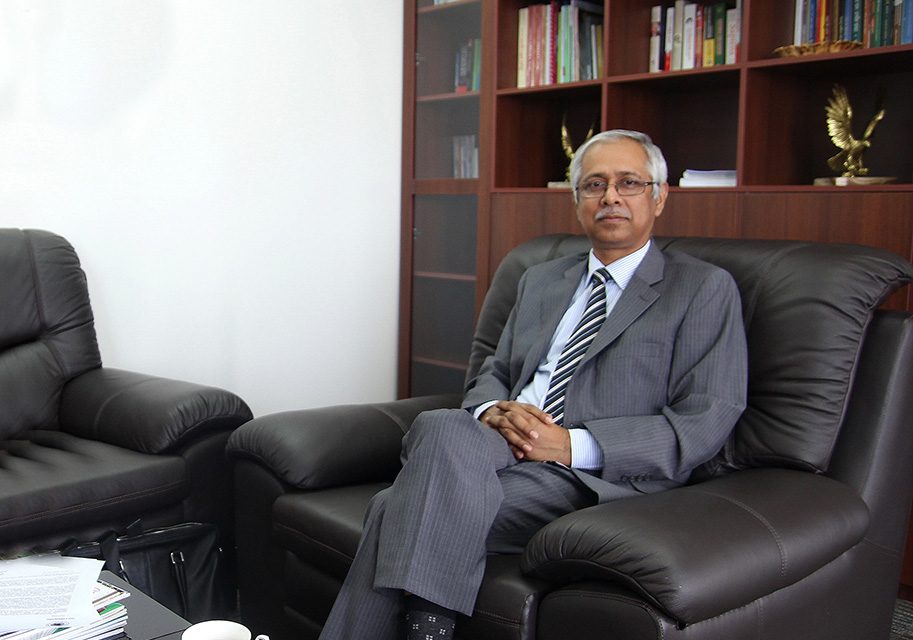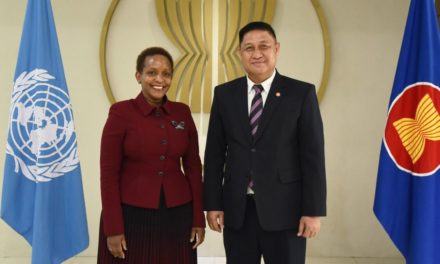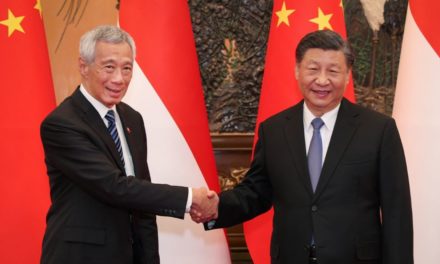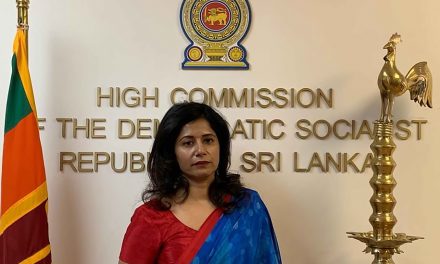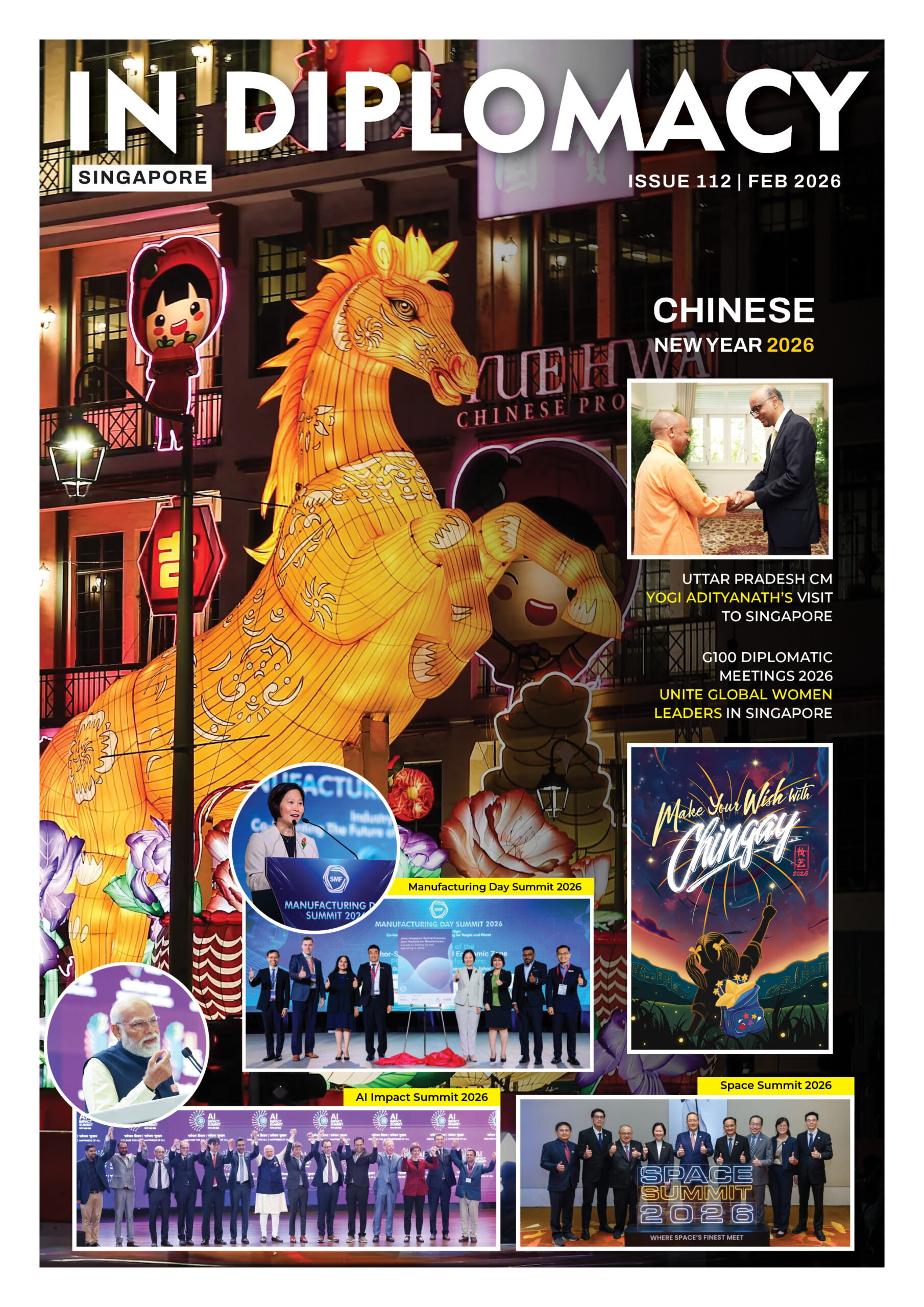The new High Commissioner of the Republic of Bangladesh, His Excellency Mustafizur Rahman presented his credentials to Singapore’s President Tony Tan Keng Yam in January 2016. In a conversation with Ms Nomita Dhar Editor-in –Chief Sun Media, shares his plans for the mission, during his tenure in Singapore.
Excellency, welcome to Singapore. It’s a pleasure and honour to have you in the country and we look forward to you representing Bangladesh in Singapore.
How long have you been here?
It’s been roughly about two months—the settling time for me. I have found everything quite smooth and systemic here so settling down is taking less time than I expected.
Could you brief our readers on your background? Where you were before coming to Singapore?
As you might know I am a career diplomat. Apart from serving in the Ministry of Foreign Affairs in Dhaka, Bangladesh, I have also served in several missions abroad, starting with our Mission in Paris. I served as the Deputy Permanent Representative of Bangladesh to the United Nations in New York and in Geneva. I also served as Deputy High Commissioner in Kolkata, India. Before joining here in Singapore, I served as the Director General of the United Nations Wing at the Ministry of Foreign Affairs, Dhaka.
During your tenure here in Singapore, what is it that you are looking forward to, and what are the areas you would like to enhance co-operation between the two countries and pay attention to?
We have always had very good bilateral relations with Singapore, ever since we opened our mission here after the Independence of Bangladesh. We started out with a trade mission which subsequently became a fully-fledged diplomatic mission. In 1983, Singapore opened up a consulate in Bangladesh. Since then, our bilateral relations have strengthened. We’ve had very good economic ties in these years, but I would like to take this to a higher level during my time here. As you are aware we have a lot to learn from Singapore as a country which has shown an extraordinary progress over the last couple of decades. We felt that Singapore is an important country to learn lessons from, and emulate in our own way.
There are many planks of bilateral ties and interaction between Singapore and Bangladesh. There is a large Bangladeshi workforce stationed here, which is helping Singapore’s economy to grow. So there are lots of Bangladeshis contributing in that sense. So in terms of the workforce welfare what should we look forward to in your tenure?
I think this is a work in progress. The Bangladeshi expats working in Singapore are contributing to the economy of both Singapore and Bangladesh, so we have to take care of their welfare. It’s an important responsibility for this mission. We are providing them with consular services, visiting their dormitories and contacting the recruiters of Bangladeshi workers to facilitate their work environment as well as to ensure a conducive workplace for them.
Looking at investment possibilities, what is the investment situation between Bangladesh and Singapore right now? Are there any new companies which have entered the market and which are the sectors, you feel, there is more need or space for growth between the two countries?
As Bangladesh is growing quite rapidly there is a need for infrastructure, energy and power. Singapore already has vast experience in these areas, so I see a vast potential for Singapore to look at investing in these areas in Bangladesh. There are in fact, already some Singaporean companies investing there, for example, Sembcorp , which already made investments in the power sector. I feel more Singaporean companies would like to follow their footsteps, and do business in Bangladesh.
The connectivity between Bangladesh and Singapore has improved tremendously over the years. Are there any new plans for other investors to come into the aviation sector or transportation of people?
According to the latest figures, there are about 150,000 Bangladeshi workers, including a few thousand Bangladeshi professionals living here. So that’s a lot of back and forth traffic between Dhaka and Singapore. Singapore Airlines has been in Dhaka for many years and we have our national carrier Biman Bangladesh Airlines as well as several private airlines. I learned that another private airline is to start operations soon.
In terms of cultural promotions, Bangladesh has a very rich cultural heritage. What can we look forward to in this space?
Cultural promotion is an important assignment for our diplomats. We in Bangladesh have a very rich cultural heritage. Perhaps, we have not done enough in this area. Some of exchanges that we had, have been largely in the private domain, in response to the demands of the expats living in Singapore and limited to our cultural troupes visiting. I do have a plan to do some work in this area.
Singapore’s own tourism structure has received excellent credentials. Are there opportunities open in Bangladesh for Singaporean companies to invest in this area?
Absolutely! Singapore has done wonderful work in this sector. We are trying to develop our own tourism sector. We have some attractions already and we also have something new to offer. We have the world’s longest unbroken sandy sea beach in Cox’s Bazaar, we also have Kua Kata Beach in Patuakhali, renowned for its beautiful sunrises and sunsets. We are trying to develop attractions like these and we can definitely benefit from the experiences of Singapore and they can help us develop our tourism sector.
The middle class in Bangladesh is growing and it also has great buying power. In fact, they are all over the world now. For Singaporean investors who might want to establish themselves in Bangladesh, would you use this as an allurement?
Surely. These days, what is becoming very popular are joint ventures. Singaporean investors may work with the Bangladeshi entrepreneurs in key infrastructure development areas. We have burgeoning business sector in Bangladesh. There are already some offices of Bangladeshi business entities in Singapore. I was told one of them has investments worth over a million US dollars. Another is a listed firm in the share market. And so yes, we do have a growing middle class and business community, they will be interested in joint venture projects.
Will you share with us the current figures of trade and investment between the two countries?
Trade is growing, but it’s largely tipped towards Singapore. For example, in the last nine months, from January to November, Bangladesh had exported goods worth USD 190 million to Singapore, whereas Singapore exported goods worth USD2.1 billion to Bangladesh.
What are the Bangladeshis buying?
Largely machinery, fuel, amongst other things. We are exporting garments, leather products, agricultural commodities and frozen food. We are trying to reduce the gap but it’s going to take a long time. We had a Singaporean company which invested USD 700 million; Sembcorp is putting in USD 390 million at the power plant it’s setting up in Chittagong on a PPP model.
Bangladesh has been in the forefront of providing its peace-keeping forces to the UN. The world is changing, with alignments shifting. Where do you see Bangladesh in this scenario?
Bangladesh has always pursued a foreign policy, which is friendship with all and malice towards none, as dictated by the father of the nation, Bangabandhu Sheikh Mujibur Rahman. His daughter, Sheikh Hasina, the present Prime Minister, is also following that policy.
We have a lot in common with Singapore in terms of maintaining world peace and security; areas we have a common position is in tackling climate change and combating terrorism, among others.
It is a totally different world we are living today. In this era of globalization and interdependence, no nation can prosper or stay in peace and harmony without the support of other countries. So, it is essential for all responsible nations to work together, pursue the policy of non-confrontation and exercise tolerance in our societies. And Bangladesh is just trying to do that with our friendly countries like Singapore. We have a very good collaboration with Singapore, in the United Nations and elsewhere for the greatest cause of humanity —for maintaining global peace and security.
You had mentioned some training exercises for Bangladesh with Singapore?
Yes, Singapore is helping us in capacity building in different areas. Bangladesh has a policy to go digital. With that in mind, the government has adopted some projects for training our government officials in the area of Information and Communications Technology. Some Singaporean institutes who have reputation in training govt officials from other countries have agreed to impart the training. The collaboration is increasing and expanding in other areas as well.
Are there any high level visits planned between the two countries?
For an ambassador, this is one of the cherished goal to materialise. Such visits add momentum to bilateral relations between two countries. So that’s in my mind and I will be working with the Singaporean authorities in this regard.
Which part of Bangladesh are you from and are your family here?
I’m not too far from Dhaka— about 80-90km in Greater Comilla where I spent my early days, before I moved to Dhaka for my studies and eventually for jobs. As for family, one of my sons is studying in the US. The younger one is studying here in Singapore in a public school. I have a wonderful wife who manages my home superbly.
How did you decide to get into the Foreign Service?
You’ll be surprised, I have a very different academic background. I am a medical graduate. After my graduation, I thought why not explore other areas, so I set for civil service exam and qualified for the foreign services. That’s how I am here!
Have the civil services changed over the years?
Indeed. We were considered ourselves as public administrator in the past now we are truly public servant. Also with globalization, use of information technology, social media, our role has transformed. It is now more challenging at the same time very interesting and rewarding. A civil servant has to cope with the changing reality. As for diplomacy, I think, multi-lateral diplomacy is more suited for a country like Bangladesh. As a small country, this set up provides more opportunities to contribute.

